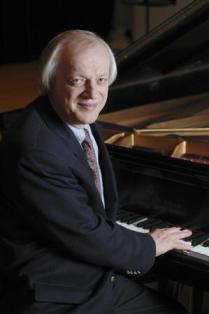
Rach 2 Marks Polusmiak's Farewell
Now, that’s Rachmaninoff.

Those who heard
Sergei Polusmiak perform his Piano Concerto No. 2 with the Northern
Kentucky University Philharmonic Orchestra Tuesday evening (April 24) in Greaves Concert
Hall had no doubts about that, awarding him a heartfelt ovation and crowding into the corridor to great him afterward.
As well they should, for it was a magnificent performance. A steady current filled Polusmiak's playing, from the majestic chords with which he opened the Concerto, to the last, soaring statement of the great theme of the finale. His tone production was heart-stopping and obviously deeply felt. This was conveyed exquisitely throughout the slow movement, to the last, long-held, slowly-dying note by the piano. The NKU players seemed inspired by his performance, and led by conductor Frank T. Restesan, delivered a handsome accompaniment. The counterpoint of violins against piano on the main theme of the Adagio, for example, was lustrous.
What was puzzling to Polusmiak’s listeners was the knowledge that NKU has decided not to renew his contract when it expires at the end of the spring semester.
Tuesday’s concert was his farewell performance at the school.
Ukrainian born Polusmiak, 61, distinguished artist-in-residence and Tom and Christine Neyer Family Professor of Music, has taught and performed at NKU since 1998. He has produced prize-winning students and given the region a taste of full-blooded Russian piano playing (his teacher in Ukraine was Regina Horowitz, sister of Vladimir Horowitz).
He has brought renewed excellence to chamber music in Northern Kentucky. His “Sergei and Friends” and “New Beginnings” concerts at NKU have featured outstanding guest artists, including members of the Cincinnati Symphony Orchestra, the Miami Wind Quartet, tenor Marco Panuccio and others.
All the more reason to regret NKU’s action.
Kurt Sander, chairman of the music department, explained it as a “change of focus.”
“It’s a matter of where Sergei’s interests are lying and where our focus is going. We’re looking at moving in the direction of hiring someone in the area of collaborative piano. Someone who can teach practical elements of accompanying as well as doing some vocal coaching, some chamber music coaching, multifaceted kinds of teaching.
“It’s not that Sergei can’t do those things, but he very much excels at what he does. We’re looking at ways to distinguish ourselves a little bit from other programs in the area and trying to appeal to a more practical-minded pianist. Certainly, he has been a great teacher here. It’s definitely a loss, but programs change.”
Question: Does NKU no longer believe that a virtuoso pianist fits into their music program, nor that training solo pianists is part of their mission?
Money is not the problem, said Sanders. “The line (i.e. the Neyer Family endowment) is not going away.” Nor is support for the NKU’s music program declining. “We’re still in pretty good shape compared to other institutions.”
The search for a successor to Polusmiak is still in the early stages, he said. “The search process has to go through a number of levels of formal approval. The position is not going away. It’s just that we’re looking at various options that will help us meet some current needs of the program.”
Not to neglect the first half of the concert, Restesan (who conducted entirely from memory) led the NKU Philharmonic in a welcome performance of the Symphony No. 2 by Alexander Borodin. (The theme of the concert was “Welcome to Russia.”) There were some imbalances, i.e. the low brasses sometimes gave it a “bottom heavy” feel, and woodwind solos did not project as well as they should have -- at least from my vantage point near the stage -- but overall, the spirit and Russian flavor of the work were well captured.